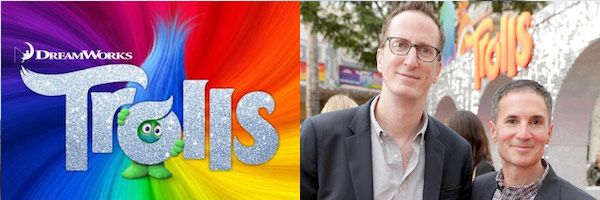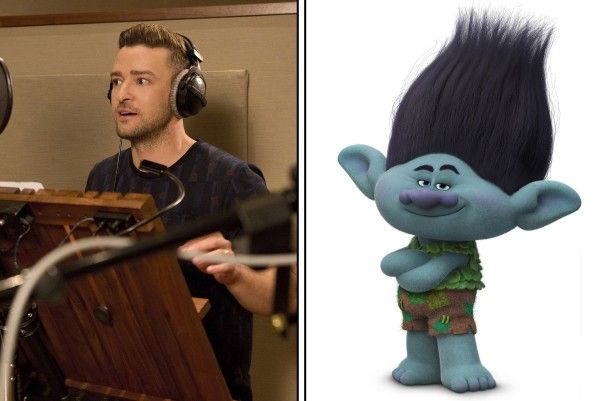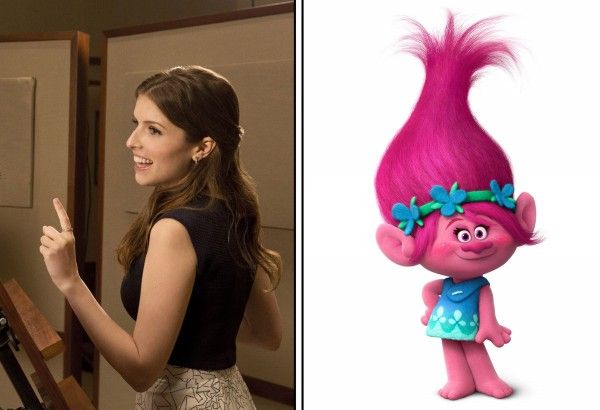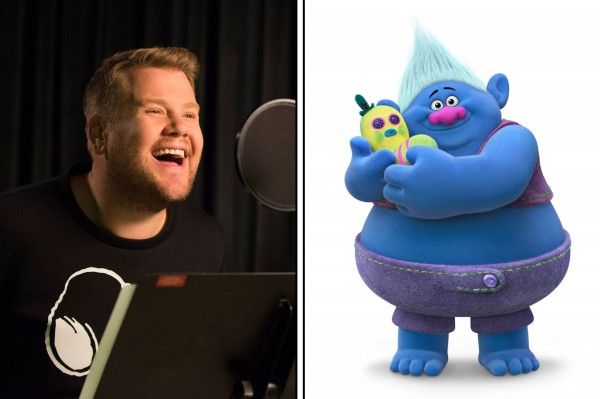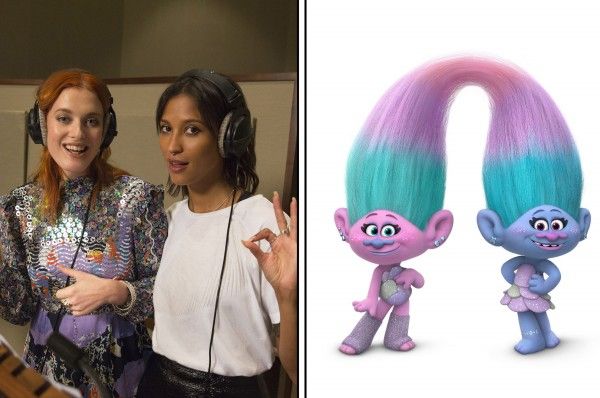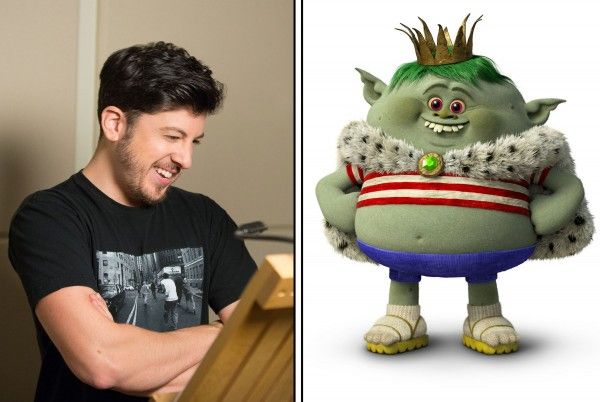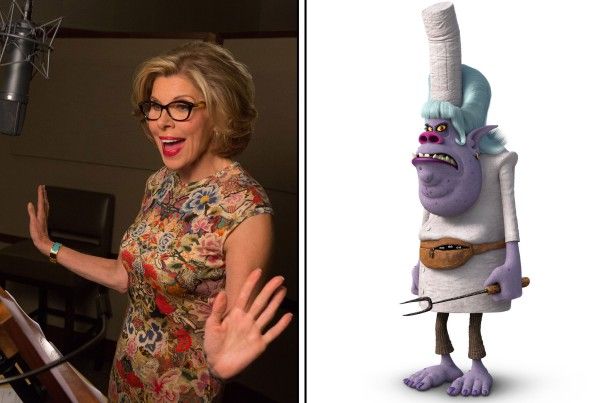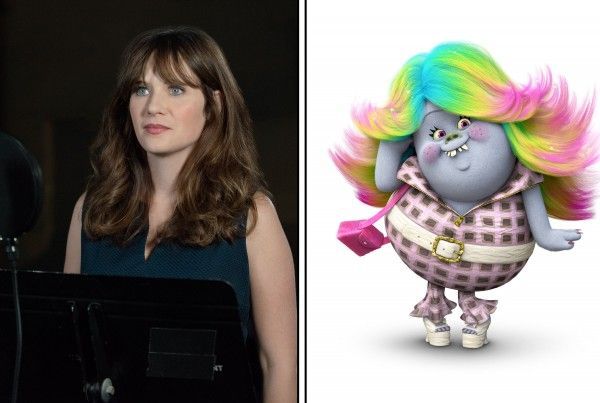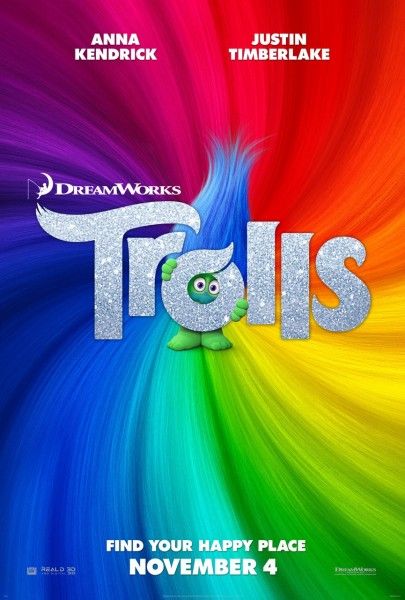With the theme of happiness at its center and utilizing music to further the film’s narrative, the DreamWorks animated movie Trolls transports audiences to a colorful world of song-and-dance and hug time, as it follows Poppy (voiced by Anna Kendrick), the happiest Troll ever born. After Troll Village is invaded by the pessimistic Bergens who enjoy eating Trolls, Poppy enlists the help of overly cautious Branch (voiced by Justin Timberlake) on her journey to rescue her friends.
At the film’s press day, screenwriters Jonathan Aibel and Glenn Berger spoke to Collider for this exclusive interview about what they started this story with, deciding on the songs, their writing process, creating a world with so many colorful characters, balancing the story of Poppy and Branch with Bridget (voiced by Zooey Deschanel), how much things changed and evolved throughout the process, why they like to make family films, not having any interest in directing, and that they’ve written another SpongeBob SquarePants movie. Be aware that there are some spoilers discussed.
Collider: When you sat down in front of the blank screen to write Trolls, where did you start? Were there specific themes you wanted to explore?
JONATHAN AIBEL: We had Poppy and the Trolls, and the idea of a movie about what happiness is. We started from there saying, “Here’s someone who’s the most positive, optimistic person. What should we have her do?” And it being a rescue story was already there. That just led us to say, “We need to send her on a journey where the worst things happen to her, like betrayals, near deaths, possible deaths and her own near death, only to have her come out on the other side, saved by her own optimism.” That was the most basic plot we had. From there, we just started building it out with (directors) Mike [Mitchell] and Walt [Dohrn]. We had to figure out who she should go on the journey with, and how to put songs into that and where. “True Colors” came in pretty early, so we put a pin in that and said that it should be an ending song, and then have a big celebration at the end. Three years later, here we are.
So, you were thinking about the songs throughout the writing and development of the script?
GLENN BERGER: It was a mix. “True Colors” was there so early that we can’t really remember a day that it wasn’t there. We knew that was a climactic beat that we were building towards. Others came while we were writing the script. With the question of, “Why don’t you sing, Branch?,” we knew we had to solve that. So, we came up with the Grandma being eaten and “Total Eclipse of the Heart,” but that was later in the process. In these animated movies, oftentimes Act 3 is that thing where you know what will happen, but the details of it remain to be seen. We all just trust that we’ll get there. In this case, it got to the point where it was really time to figure out Act 3, beyond just the abstract, and we knew there would be a song that was so happy inducing that it actually convinces all the Bergens to stop eating Trolls. You can’t just find a song like that. A lot of the songs we had picked were perfect, but when you get to that song, it has to be perfect and convey so much. So, you hire Justin Timberlake.
AIBEL: Poppy has her song, when she goes off on her journey. For awhile, it was “I Have Confidence” from The Sound of Music, as a temp song. You need something on the screen, and the idea was having someone sing with confidence while having horrible things happen to her. That helped, just in the storytelling. You see that and you get what’s happening. It felt like the right thing, which you want to make sure of, before you have a song written, recorded and produced.
BERGER: One of my favorite songs in the whole movie is “Get Back Up Again.” When you make these things over three years, you see them hundreds of times. With this one, we never got sick of it because it’s so filled with music. Even when you get tired of the jokes ‘cause you’ve heard them a hundred times, when the songs come on, they’re all so good and so well performed that it got me through all of those screenings.
What is your normal writing process like? Do you always work together?
AIBEL: We’re usually working together. Sometimes early on, we’ll split stuff up and each take a scene, just so that we can get something really rough to start working on together. Otherwise, we go word by word, line by line, writing it together. For comedy, it certainly helps to pitch jokes to another person instead of just thinking and sensing what would be funny. For our process, it means that by the time we’re actually turning something in, it’s maybe the fourth or fifth draft because we’ve been over it so many times.
Are you guys usually on the same page, especially when it comes to jokes?
BERGER: It’s so rare that the first thing one of us says to the other is the right thing. If that were the case, our job would probably take two weeks instead of three years. We spent probably 75% of our time, arguing with each other, or creatively disagreeing, and then the other 25% was trying to remember what one of us said that won the argument and typing that up.
With something like this, where the characters are so happy and optimistic, did you have to remind yourself to be happy enough?
AIBEL: It was actually really fun because we had just come off of Kung Fu Panda and, as fun as Po is, the movie is surrounded by a darkness. It’s heavy. So, to go from that to this was really fun. It was a palate cleanse. As writers, it was a challenge because we hadn’t done anything this light before. For us, it was fun to turn up the brightness, but we could also still keep a bit of that darkness. I think the brightness lets you balance it out and go a little darker.
This is the story of Poppy and Branch, but Bridget is so delightful, in her own right. How did you balance her story in the mix?
BERGER: That was a big surprise to all of us. In an early screening, some people worried and were like, “We’re in the middle of Act 2 and Bridget and Gristle take over the movie. What’s going on? You can’t do that!” And we all collectively decided that it’s a gift that somewhere in Act 2, where the movie’s energy usually dips, you suddenly have characters where people are suddenly leaning forward and saying, “Who are they? I wanna know more about them!” We realized that the answer was not to pull back on that, but to integrate Poppy and Branch and the main story into that story, as much as possible. That’s when we started doing more with that.
AIBEL: What also helped was that we wrote her very blunt. My favorite line of hers is when Gristle gives her the necklace and she goes, “It’s pretty, I guess.” Mike and Walt had the confidence to say that we could have a character who, unlike Poppy, is afraid of the world.
You have to have a great script to work from, but this film has such a great voice cast. What was it like for you guys to see and hear these characters brought to life, in this way?
BERGER: It’s a gift. We got super lucky. The Panda movies have their share of fine actors, as well, but the pure comedy talent of even the smallest parts is great. Everyone has their own reasons for wanting to be in a movie like this. The fact that it’s a musical appealed to a bunch of people.
How much did things change and evolve, through the writing process? Were there any major changes?
BERGER: There were some key character changes. For quite a long time Creek, Russell Brand’s character, was a female character who was Poppy’s nanny. Poppy’s mother had died and she was being raised by an older nanny, who ended up having the same backstabbing role in the story, but it seemed so insurmountable to have a mother figure doing that to Poppy. It seemed very hard to come back from.
AIBEL: Even the Brothers Grimm wouldn’t go that dark.
BERGER: And then, when we changed that older maternal character to Creek, there was a double benefit because it was also a romantic rival for Branch and it allowed us to play with that story, a little bit. Songs and jokes changed. There were a lot of line changes.
AIBEL: Chef changed. She always had the same role, but we played with how evil she was and how dark we could take her.
BERGER: We talked about villain goals and we played with various extremes, and whether it should be some form of world domination or a chain of restaurants. We’re all happy with where it landed. Oftentimes, the instinct is to go as global as possible with world domination. This was a chance to do something more personal. Her story was a revenge story. She had power when the Bergens were eating Trolls, and she was the person making people happy. In a world without Trolls, she has no personal power, so she wants to arrange the world so that people eat Trolls again. She represents, thematically, that happiness comes from external sources because that gives her power. That just felt real and personal.
When you do a movie like this, with so many characters that you could follow on their own adventures, do you automatically start thinking about sequels? Do you want to explore this world more?
BERGER: I don’t know that we put in any Easter eggs on purpose. All of our energy was focused on making this movie as good as it could be, but I don’t think we’ve ever worked on a movie where there were so many character, any of whom could have their own movie. We look forward to, ten years from now, talking about Trolls with the same weariness that we could talk about Panda.
What do you enjoy most about writing for animation?
AIBEL: It’s the fact that animation lets you do stuff, over and over again, and keep working at it. When we do a live-action movie, often you write the script and turn it in and that’s your job on it. With animation, you write the script, you turn it in, you get notes, you try it again, and then you rewrite something else, you’re there for casting and the storyboards, you meet with the production designers, and you go into the editing room. We’re helping tell a story in which the end product isn’t the words on the page, but the audience’s experience of it. So, for us, it’s just more fun.
BERGER: There are more chances to make it better. With live-action, even if the last script we turned in was absolutely perfect, you shoot it and there’s always a continuity problem or a character motivation problem. Maybe you can do a reshoot of 5% or 10% of a movie, but on animated movies, a year out, you can throw out and rebuild at least half of the movie. We love that. We’re perfectionists, so it’s much better. It’s a double-edged sword, too. If something is wrong with this movie, it’s absolutely our fault because we’ve had three years to make it better and we either couldn’t or didn’t see the problem. But when it goes well, it’s really gratifying to know that those painstaking years of fine-tuning something paid off.
When you spend so much time working on one project, like you do with an animated film, once it’s all done and you can’t make any more changes to it, do you like to take some time to regroup, or do you like to jump right into the next thing?
AIBEL: We’re super lucky because we have to stop about six months before the movie is done. So, we had pencils down, months and months ago.
BERGER: Once they’re doing the sound mixing and final editing, there’s a certain point where you can’t change it.
AIBEL: So, we move on and do other things.
Are you currently working on something now, or have you written anything since this?
AIBEL: We’ve got another SpongeBob movie that we turned in that we’re hoping Paramount makes. We have a couple other things that we can’t really talk about yet. And we remain ever hopeful that we’ll have another chance to make a Trolls movie.
What are the challenges in keeping a character like SpongeBob SquarePants alive, interesting and fresh?
AIBEL: Luckily, it’s by not watching every episode he’s ever been in.
BERGER: We never worked on the TV show.
AIBEL: We work with Paul Tibbitt and Steve Hillenburg on that, and they know it so well. One of the things we bring is a bit of an outsider’s perspective. We’re fans of the show and have watched many, many, many episodes, but we didn’t spend 18 years making all of those episodes. Our collaboration with them was so great because we got to help expand the world.
Do you want to keep working in animation?
BERGER: I feel like Brad Bird said this, once upon a time, so I’ll still it from him, that animation is a technique and not a genre. Whether we’re kidding ourselves or not, we think what we do is family films. If the question is, do we want to keep doing family films? Absolutely! That’s what we enjoy doing. The stories we enjoy telling seem to be bigger and, right now, animation seems to be the place that’s doing those kinds of stories the most. In live-action, the four quadrant movies are more of the superhero movies. We’ve done a bunch of live-action/animation hybrid stuff. Whether it’s fully animated, fully live-action or some combination is less important than the fact that it’s something for all ages with a big, giant, fun story with a huge emotional core.
AIBEL: The projects we’re doing, going forward, aren’t just about writing the script and turning it in. We want to take the experience we’ve gained in ten years of animation and be writers who understand how editing work, how the pace goes, and how movies come together. We want to start doing more on the producing side.
Have you thought about directing?
BERGER: We have actively avoided that, for years and years. Through the years, Jeffrey [Katzenberg] has been very, very nice in trying to get us to direct. Mike [Mitchell] and Walt [Dohrn] are so good at what they do and we have so much respect for what they do, and similarly they have so much respect for what we do. We want to do more of the writing and producing side of it, and know that people like them, who come from the storyboard and more visual background, we can make a great team with. If we were to focus on that side, it would take time away from the thing that we do best, which is the storytelling, and it would put us in a place where we just know we’re not as good as Mike and Walt, doing that. If we can keep working with them and people like them, it’s just more fun. Frankly, the final six months of directing a movie seems grueling. We’re so delighted to be banging our heads against the blank page of a new movie while they’re doing the color correction.
AIBEL: It’s just such hard work. Every single thing in the movie has to be designed, looked at, debated and approved, in every shot, shot by shot.
Trolls is now playing in theaters.

